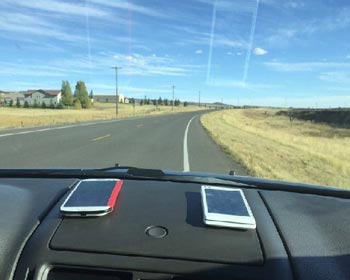NDSU Researchers Refine Techniques for Measuring Road Roughness with Cell Phones
Posted: Oct 12, 2021
 Transportation researchers at NDSU recently published techniques that will help refine the use of sensors in smart phones to measure road roughness.
Transportation researchers at NDSU recently published techniques that will help refine the use of sensors in smart phones to measure road roughness.
"Effects of Smartphone Sensor Variability in Road Roughness Evaluation" by Hafiz Usman Ahmed, Liuqing Hu, Xinyi Yang, Raj Bridgelall and Ying Huang was recently published in the International Journal of Pavement Engineering. Ahmed and Hu are graduate research assistants in the NDSU Department of Civil Engineering. Yang is a transportation and logistics doctoral student who is also a research assistant at the NDSU's Upper Great Plains Transportation Institute. Bridgelall is an assistant professor of transportation and logistics and a researcher at UGPTI. Huang is an associate professor of civil engineering at NDSU.
Transportation agencies use pavement management systems to collect data on pavement roughness and other surface problems to identify problem areas for repair or replacement. Bridgelall and others found that smart phones, typically equipped with accelerometers and other sensors, can be used in place of expensive and specialized equipment to measure road roughness. In the most recent research at NDSU, the researchers found that measurements and sampling rates from various smartphones, even those from the same manufacturer, varied significantly, resulting in inconsistent road roughness measurements. The researchers proposed a statistical calibration for the resulting data that would normalize the measurements for consistent measurements across phones.
The research was funded by the Mountain-Plains Consortium, a consortium of eight universities in the mountain-plains region led by NDSU and funded by the U.S. Department of Transportation's University Transportation Centers Program.